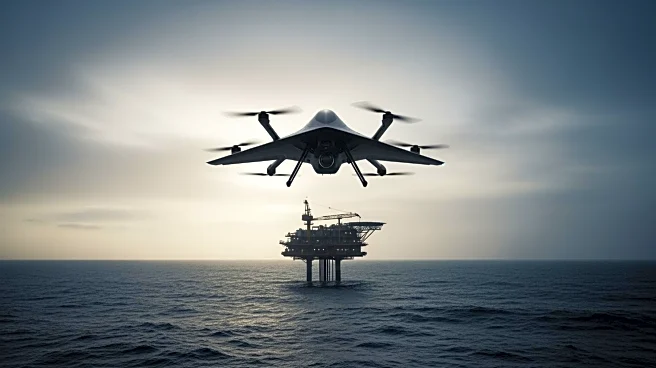What's Happening?
Ukraine's navy has executed a drone strike on a Russian-occupied oil platform in the Black Sea, known as the Sivash. This platform has been used by Russian special forces for surveillance purposes. The
strike involved both air and surface drones, targeting the platform's topsides and jackup legs. The platform, part of the Boyko Towers, was originally purchased by Ukraine but captured by Russian forces during the 2014 Crimea invasion. It has since been equipped with radars and staffed by Russian monitoring teams. Ukraine resumed attacks on these platforms in May 2025, with the latest strike announced on Monday.
Why It's Important?
The drone strike on the Sivash platform underscores Ukraine's strategic use of unmanned systems to disrupt Russian surveillance operations in the Black Sea. By targeting these platforms, Ukraine aims to weaken Russia's maritime domain awareness and reduce its ability to monitor Ukrainian movements. This action highlights the ongoing military tensions in the region and Ukraine's commitment to reclaiming control over strategic assets. The use of drones in such operations reflects a broader trend in modern warfare, where unmanned systems play a critical role in intelligence and combat missions.
What's Next?
Ukraine may continue to target Russian-occupied platforms in the Black Sea to further diminish Russian surveillance capabilities. These actions could provoke retaliatory measures from Russia, potentially escalating military engagements in the region. The ongoing conflict may lead to increased international attention and diplomatic efforts to address security concerns in the Black Sea. Ukraine's use of drones in these operations may also prompt other nations to explore similar tactics in their military strategies.
Beyond the Headlines
The strike on the Sivash platform highlights the ethical and legal complexities of using drones in military operations. As unmanned systems become more prevalent, questions about accountability, civilian safety, and international law arise. The situation in the Black Sea serves as a case study for the implications of drone warfare, influencing future policy discussions on the regulation and deployment of such technologies in conflict zones.











